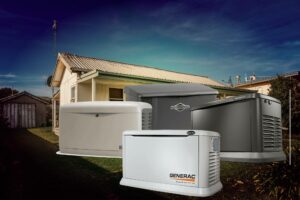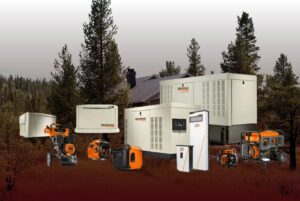Power outages are unpredictable and can strike at any time, leaving us in the dark both literally and figuratively. Whether it’s due to extreme weather conditions, electrical failures, or unforeseen circumstances, the loss of power can disrupt our daily lives. In such moments of vulnerability, having a reliable home generator becomes more than just a luxury—it becomes a necessity.
In this article, we’ll delve into the world of home generators, exploring how they work, the different types available, and the best options for your specific needs. So, let’s embark on a journey to unveil the power within and ensure that when the lights go out, your home remains a beacon of comfort and safety.
How does a generator work on a house?
To understand the magic behind home generators, we first need to grasp the basic principles of their functionality. At its core, a generator is a device that converts mechanical energy into electrical energy. In the context of a home generator, this process involves a combustion engine turning a rotor within a magnetic field, thus generating an electric current.
The generator’s engine can run on various fuels, including gasoline, propane, or natural gas. This versatility allows homeowners to choose a generator that aligns with their preferences and the availability of fuel in their area. As the generator produces electricity, it flows through your home’s electrical system, providing power to essential appliances and ensuring your daily life continues uninterrupted during power outages.

What are the 3 types of generators?
Not all generators are created equal, and understanding the different types available is crucial for making an informed decision about which one suits your needs best. Let’s explore the three main types of generators:
- Portable Generators: Portable generators are versatile and convenient, providing a temporary power source during outages. They are typically fueled by gasoline and can be moved to different locations as needed. While they offer flexibility, portable generators are best suited for powering a few essential appliances rather than your entire home.
- Standby Generators: Unlike portable generators, standby generators are permanently installed outside your home. They are connected directly to your home’s electrical system and often run on natural gas or propane. Standby generators automatically kick in when they detect a power outage, ensuring a seamless transition without any manual intervention.
- Inverter Generators: Inverter generators are known for their efficiency and quiet operation. They produce high-quality, stable power, making them ideal for sensitive electronics. Inverter generators are portable and fuel-efficient, making them a popular choice for recreational activities such as camping, as well as for backup power at home.
What kind of generator is best for home use?
Selecting the right generator for your home involves considering various factors, including the size of your home, the appliances you want to power, and your budget. While portable generators are a cost-effective option for short-term outages, they may not be sufficient for larger homes or extended power losses.
For homeowners seeking a more comprehensive solution, standby generators are often the best choice. These generators provide continuous power to your entire home and can operate for an extended period if connected to a reliable fuel source. Additionally, standby generators offer automatic startup, eliminating the need for manual intervention during outages.
Inverter generators, on the other hand, are an excellent option for those who prioritize fuel efficiency, quiet operation, and the ability to power sensitive electronics. While they may not have the capacity to supply an entire house, they are perfect for maintaining essential devices and appliances during shorter outages.

Where should a whole house generator be placed?
Installing a whole house generator involves careful consideration of its placement to ensure optimal performance and safety. Here are key factors to keep in mind:
- Distance from the House: While a standby generator needs to be close enough to connect to your home’s electrical system, it should also be positioned a safe distance away to prevent carbon monoxide fumes from entering your living space. Local building codes typically dictate the minimum distance required.
- Ventilation: Adequate ventilation is crucial for the safe operation of a whole house generator. Ensure that the installation location allows for proper airflow to dissipate heat and exhaust fumes. This may involve installing ventilation systems or positioning the generator in an open, well-ventilated area.
- Accessibility for Maintenance: Generators, like any other mechanical device, require regular maintenance. Choose a location that provides easy access for technicians to perform routine checks, repairs, and fuel refills. Accessibility simplifies the maintenance process and ensures the generator remains in peak condition.
]By understanding how generators work, exploring the different types available, and carefully selecting the best option for your home, you empower yourself to face power disruptions with confidence.
Remember, the right generator is not just a piece of machinery; it’s a silent guardian, standing ready to restore normalcy when the lights dim. So, take the time to choose wisely, install strategically, and embrace the peace of mind that comes with having the power within your grasp, even in the darkest moments.
